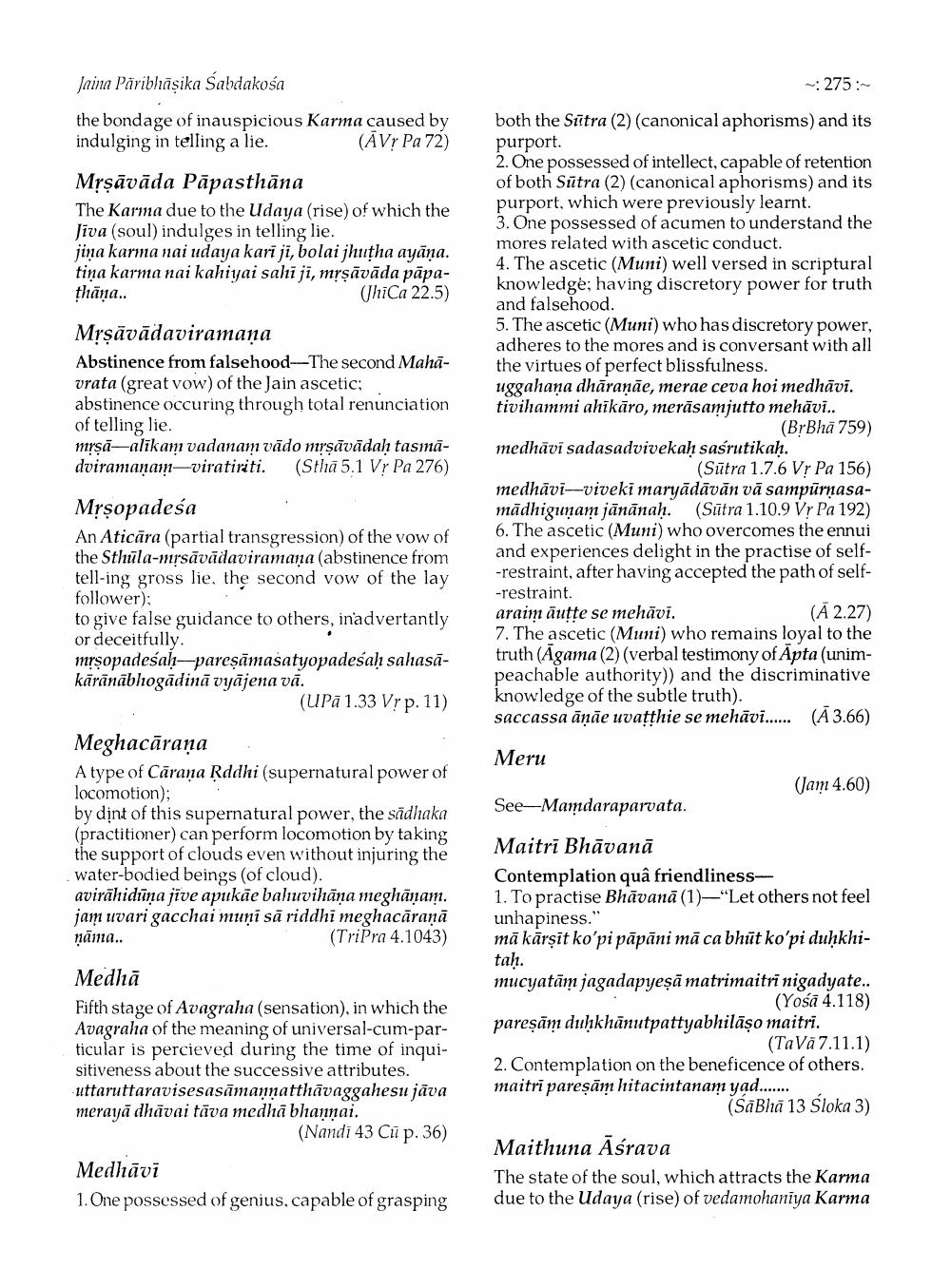________________
Jaina Pāribhāsika Sabdakosa
the bondage of inauspicious Karma caused by indulging in telling a lie.
(AV? Pa 72)
Mrşāvāda Pāpasthāna The Karma due to the Udaya (rise) of which the Jiva (soul) indulges in telling lie. jina karma nai udaya kari ji, bolai jhutha ayāņa. tiņa karma nai kahiyai sahiji, mrşāvāda pāpathāņa..
(ThiCa 22.5)
Mrşāvādaviramana Abstinence from falsehood-The second Mahāvrata (great vow) of the Jain ascetic; abstinence occuring through total renunciation of telling lie. mrsa-alikam vadanam vādo mrşāvādah tasmādviramanam-viratiriti. (Sthā5.1 V? Pa 276)
275:both the Sūtra (2) (canonical aphorisms) and its purport. 2. One possessed of intellect, capable of retention of both Sūtra (2) (canonical aphorisms) and its purport, which were previously learnt. 3. One possessed of acumen to understand the mores related with ascetic conduct. 4. The ascetic (Muni) well versed in scriptural knowledge; having discretory power for truth and falsehood. 5. The ascetic (Muni) who has discretory power, adheres to the mores and is conversant with all the virtues of perfect blissfulness. uggahana dhāraņāe, merae ceva hoi medhāvi. tivihammi ahikāro, merāsamjutto mehāvi..
(BrBhā 759) medhāvi sadasadvivekaḥ sasrutikah.
(Sūtra 1.7.6 V? Pa 156) medhāvi-viveki maryādāvān vā sampūrnasamādhigunam jānānah. (Sūtra 1.10.9 Vr Pa 192) 6. The ascetic (Muni) who overcomes the ennui and experiences delight in the practise of self-restraint, after having accepted the path of self-restraint. araim āutte se mehāvi.
(A 2.27) 7. The ascetic (Muni) who remains loyal to the truth (Agama (2) (verbal testimony of Apta (unimpeachable authority)) and the discriminative knowledge of the subtle truth). saccassa āņāe uvatthie se mehāvi...... (A3.66)
Mrşopadeśa An Aticāra (partial transgression) of the vow of the Sthüla-mrsāvādaviramana (abstinence from tell-ing gross lie, the second vow of the lay follower); to give false guidance to others, inadvertantly or deceitfully. mrşopadesah--pareșāmasatyopadesah sahasākārānābhogādinā vyājena vā.
(uPõ 1.33 Vrp. 11)
Meru
(Jam 4.60)
See-Mamdaraparvata.
Meghacāraņa A type of Cāraņa Rddhi (supernatural power of locomotion); by dint of this supernatural power, the sādhaka (practitioner) can perform locomotion by taking the support of clouds even without injuring the water-bodied beings (of cloud). avirāhidūņa jive apukāe balıuvihāna meghānam. jam uvari gacchai muni să riddhi meghacāraņā ņāma..
(TriPra 4.1043)
Maitri Bhāvanā Contemplation quâ friendliness1. To practise Bhāvanā (1)—"Let others not feel unhapiness." mā kārşit ko'pi pāpāni mā ca bhūt ko'pi duḥkhi
tah.
Medhā Fifth stage of Avagraha (sensation), in which the Avagraha of the meaning of universal-cum-particular is percieved during the time of inquisitiveness about the successive attributes. uttaruttaravisesasāmannatthāvaggahesu jāva merayā dhāvai tāva medha bhannai.
(Nandi 43 Cū p. 36) Medhāvi 1. One possessed of genius, capable of grasping
mucyatām jagadapyeşā matrimaitri nigadyate..
(Yośā 4.118) pareșām duhkhānutpattyabhilāṣo maitri.
(TaVā7.11.1) 2. Contemplation on the beneficence of others. maitrī pareșām hitacintanam yad.......
(SãBhā 13 Sloka 3)
Maithuna Āśrava The state of the soul, which attracts the Karma due to the Udaya (rise) of vedamohaniya Karma




